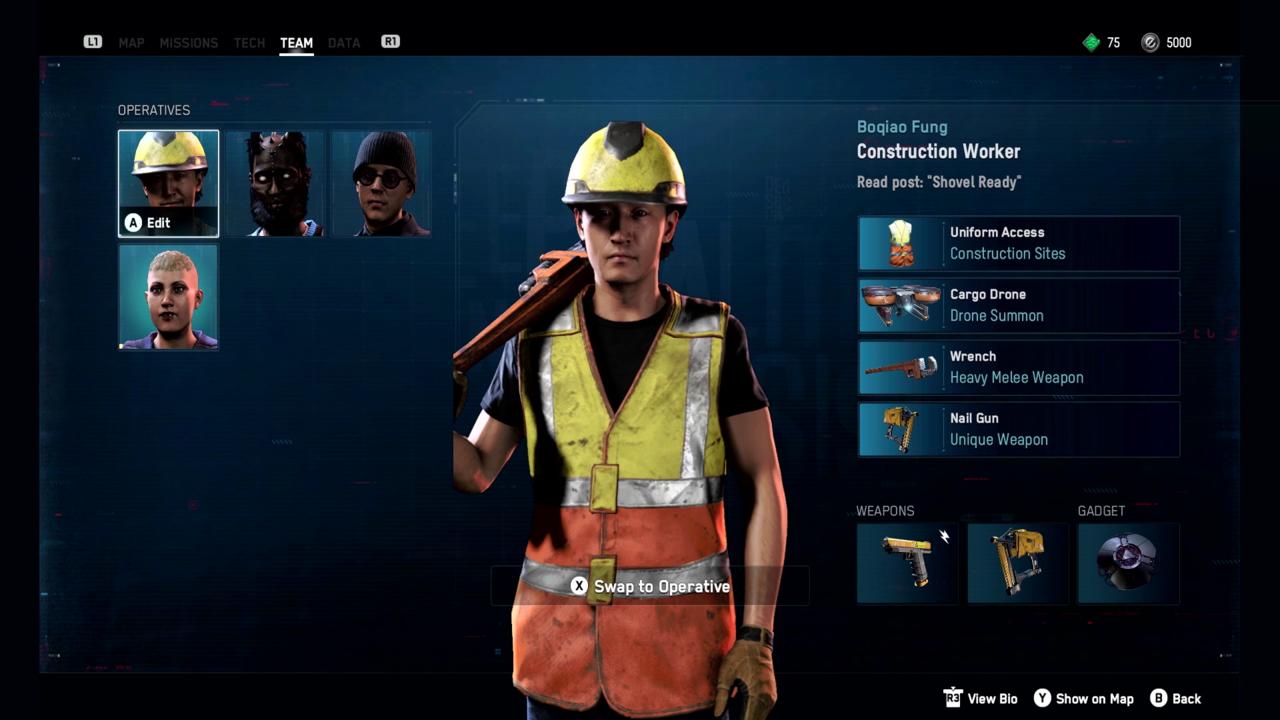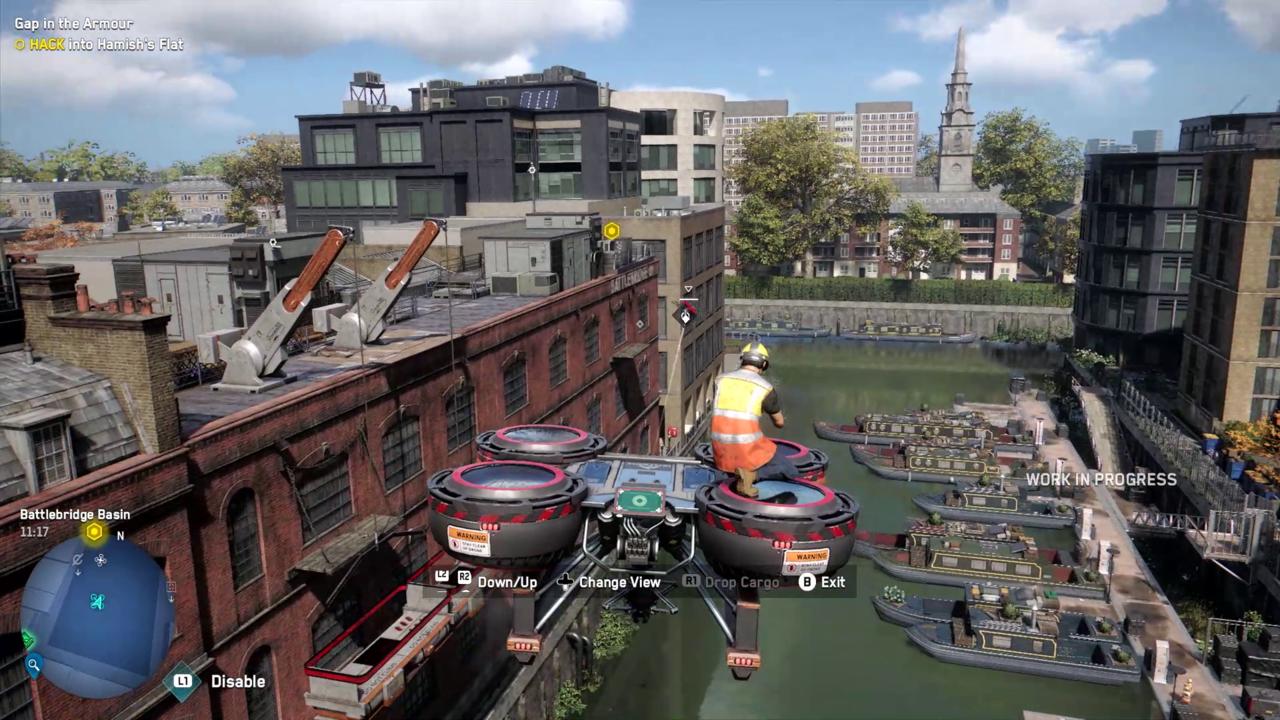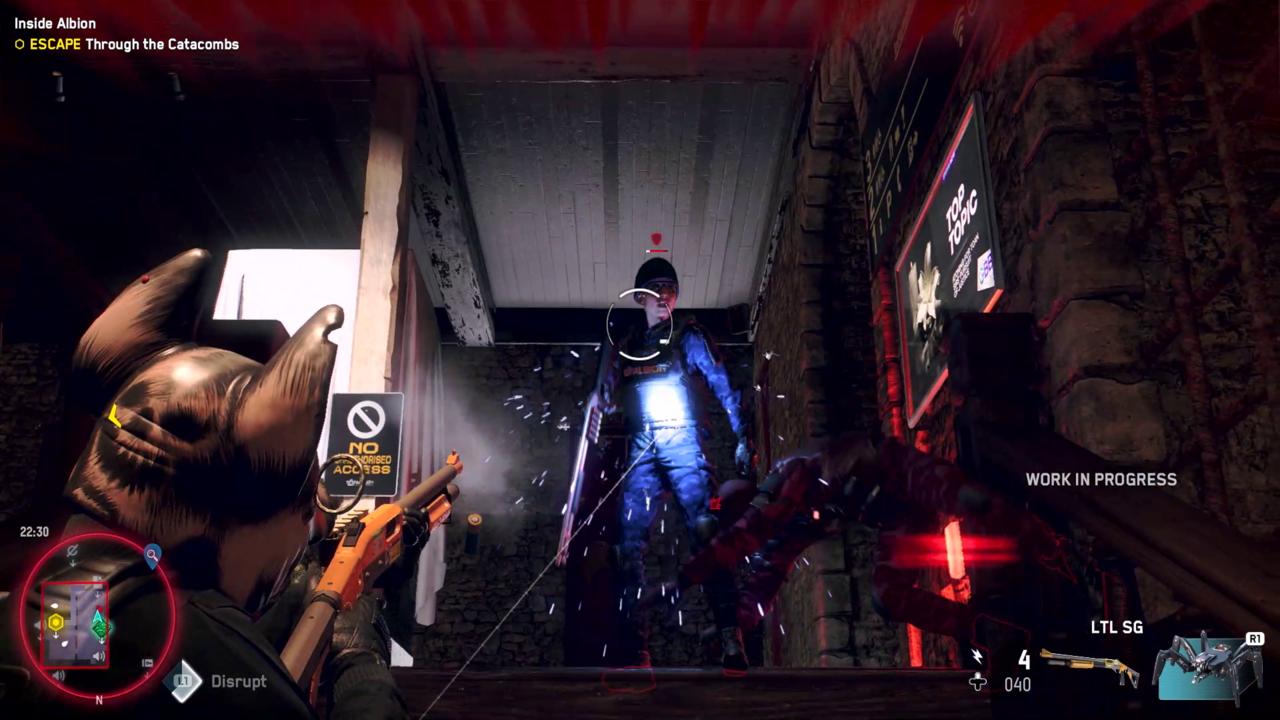At its core, Watch Dogs: Legion is trying to tell a story about a people's uprising. It's not about one hero saving the day or a protagonist who has all the answers to single-handedly enact change in the world. In London, the hacker collective DedSec is composed of anyone. Nearly every NPC on the street can be recruited to join the cause as a playable character and put their own strengths, weaknesses, and perks to use. And based on my four-hour hands-on demo with the game, I see the "play-as-anyone" system as a thematic fit, and also a fascinating take on a class-based system. It offers a variety of playstyles, and it's pretty damn impressive how well it works.
For a more detailed breakdown of the game's narrative and political backdrop, be sure to read my Watch Dogs: Legion story-specific preview.
After a brief prologue, I was jumped to about 10-ish hours into the game. I had a handful of characters to choose from, but focused on using my construction worker since he was equipped with a big-ass wrench for stronger melee attacks and a rideable flying drone to summon on-demand. And luckily for me, this eventually led to a strong illustration of just how character variety can affect your experience.
In one mission, I had to track the whereabouts of a person-of-interest for DedSec, who was taken hostage by the private military corp Albion (the agency running law enforcement in Legion). After brief investigations through holographic reconstruction of past events--think ECHOs from The Division--I tracked this person's location to a construction site guarded by Albion security. This was hostile territory, but since I was playing a construction worker fitted with a hardhat and safety vest, I walked right in unsuspected.

If I got too close, went in sprinting, parkoured about, or pulled out a weapon, security would recognize that I wasn't supposed to be there--but as long as I kept my distance and cool, all would be fine. One guard had to be dealt with to get to the hostage, so I distracted him with a phone hack followed by a quick melee takedown. Another guard had to be knocked out to escape, but before anyone saw the body, I cloaked his unconscious body as I made my clean getaway.
A few other missions required me to reach rooftops and manually operate a specific terminal to hack and extract data, or take control of a bot to solve circuit puzzles. I could have found a route on-foot to weasel my way up to where I needed to go, but instead I called in my cargo drone, hopped on top, and remotely controlled it to fly me up to the objective. It almost felt like an exploit, but guards still posed threats. In most cases, I wasn't able to rely on the guise of my occupation as a construction worker which meant stealth, confrontation, hacker's wit or a bit of everything.
One of my favorite games immediately came to mind following these missions: IO Interactive's Hitman. I don't expect Legion's open world to feature complex, deliberate missions to the same extent, but the mix of stealth-action, hiding in plain sight, environmental manipulation, and cleverly using high-tech tools sparked the comparison. A comedy of errors or full-blown firefight can happen, but being able to adapt to emergent situations seems to pay off, too, in addition to just being plain fun to experience.

Another mission required me to recruit a former Albion officer named Jon John, and in this system of "play-as-anyone," you must first do something for them in exchange, which plays out like a side quest. I had to get a hold of medical supplies for Jon John's friend since the government wouldn't help and the local crime syndicate slangs the meds on the streets for a steep price. I'd go to one heavily guarded location to obtain data on where to find the van full of the meds, then infiltrate another guarded location to steal said van. Helping a potential comrade circumvent a broken healthcare system through a few classically designed open world objectives won them over, as if it's a sort of character loyalty mission.
After easily swapping to the newly recruited operative through the menu, the main mission then followed. It played similarly to the aforementioned construction site but in tighter spaces, as I had to infiltrate a behind-closed-doors meeting to find out the truth of Albion's motivations. Again, these are tense moments of keeping distance to not blow my cover, reading the room, and distracting guards through environmental manipulation; the keys to getting through unscathed.
Eventually things turned hostile, but I didn't necessarily have to kill anyone in my way, because Legion gives you access to plenty of viable less-than-lethal (LTL) weapons. Pistols, shotguns, and SMGs have LTL versions that shoot shock rounds instead of bullets, so you don't miss a beat in a firefight if a non-lethal approach matters to you. I can't speak to their effectiveness relative to their lethal counterparts, and I'm not sure if certain outcomes are tied to using either approach, but this dynamic at least gives you the choice to play how you want your DedSec operatives to be reflected in the game world. Considering Watch Dogs 2's limited LTL options despite the tone of its story, this is a welcome change.

This system of DedSec operatives, mostly made up of randomly generated characters found in the streets, has been rather impressive thus far. As silly as some results may be, like a grandma who's proficient in MMA, it drives home the idea that an uprising is the work of a collective of common folk, not just specially equipped heroes. As a function of gameplay, it outfits you with specific skill sets to work with. You can also customize a basic loadout, with two weapons and one tech device, like a cloaking device or sneaky spiderbot, so you at least have reliable tools to fall back on.
Even though most characters are generated and I don't expect big backstories, they all have biographical information to provide some semblance of charisma, as well as spoken lines in cutscenes, made possible by a variety of voice actors--they're not silent, wooden protagonists. The Deep Profiler mechanic also gives potential recruits personalities and daily routines, which are important to the recruitment process for characters who have reservations about DedSec. That's all to say that the play-as-anyone idea doesn't feel tacked on, and the implication is that there'll be wild possibilities in the full game.
Not everything is so drastically different in Legion, however. In traditional Watch Dogs fashion, all characters have the core ability to remotely hack most objects in the world: control panels to open doors, cameras to scout and remotely access data, and enemy phones to cause distraction. Although I enjoy a good connecting-the-circuitry puzzle, the demo missions seemed to rely on it a bit too much as a way to break up the pace.
Nancy Drew: Mystery of the Seven Keys | World Premiere Official Trailer Modern Warfare III & Warzone - Official Cheech & Chong Bundle Gameplay Trailer The Fallout TV Show's Biggest Easter Eggs Teenage Mutant Ninja Turtles: Splintered Fate – Announcement Gameplay Trailer Dead Island 2 – Official SoLA Expansion Gameplay Launch Trailer Little Kitty, Big City – Release Date Reveal Harold Halibut GameSpot Video Review SteamWorld Heist II – Official Reveal Gameplay Trailer Cat Quest III - Release Date Trailer LORELEI AND THE LASER EYES | Release Date Trailer Honkai: Star Rail — "Non-Zero-Sum Game" | A Moment Among the Stars Animated Trailer Stellar Blade - Official Live Action Release Date Trailer| PS5
Please enter your date of birth to view this video
By clicking 'enter', you agree to GameSpot's
Terms of Use and Privacy Policy
Structurally, Legion appears to lean into open world traditions such as clearing out territories; here, the context is liberating London's boroughs from Albion control. Completing specific side objectives builds up the "Defiance" meter, and once full, you'll unlock a final mission to reclaim that district. It was a challenging, interesting mission that mixed infiltration, combat, and remote controlling drones--the things that make Legion so fun. So, while it uses common open world tropes, Legion has at least shown that it's trying to package it in a way that's fitting and enjoyable, with the reward of seemingly decreasing enemy presence in that borough.
Many systems at play in Legion feed into your freedom to approach objectives the way you want, and the different options flow smoothly into one another, mixing stealth, combat, puzzle elements, and working with operatives' specific perks. And the set pieces built into the open world bring out those qualities. London is a vibrant city with civilians that constantly chat shit, but it's also a tech dystopia under authoritarian control and organized crime. You'll have a lot to do in London, and from what we've seen so far, it's exciting work.
If you want a deeper dive into its narrative and the political context that's been built around it, be sure to read my Watch Dogs Legion story preview and interview with game director Clint Hocking.

